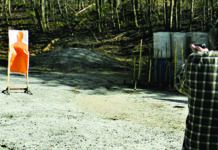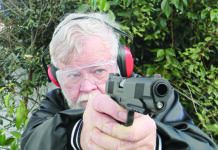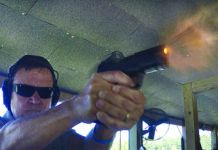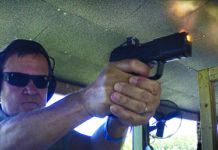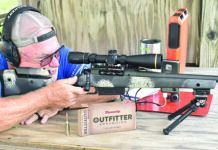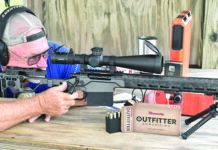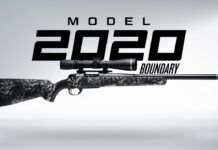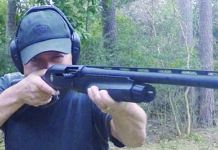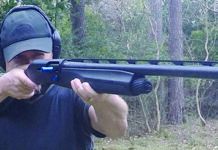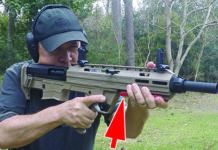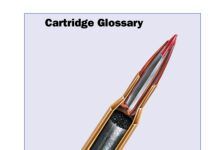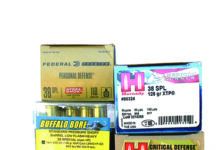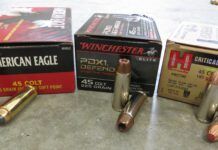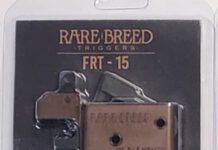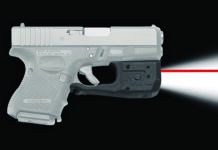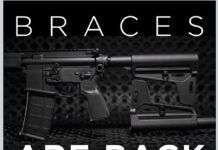Gun Tests Grade: B+
$1999
Savage is well known for its rifles and for the collar nut is uses to precisely headspace its rifles. They bring that precision and more to the market with the new Model 110 Elite Precision, designed specifically for the long-range precision crowd. The Model 110 Elite Precision uses a 26-inch stainless barrel with a 1:7.5-inch twist. That should be plenty fast to stabilize any .243-inch-diameter bullet commonly in use for this sport. Savage attaches a self-timing taper-aligned muzzle brake, and we found it to work fairly well.
| Action Type | Bolt |
| Action | Matte-black stainless steel |
| Overall Length | Adjustable |
| Weight Unloaded | 12.75 lbs. |
| Weight Loaded (108 grain, 4+1 rounds) | 13.3 lbs. |
| Overall Height w/o Scope Mount | 7.6 in. |
| Barrel | 26 in. long, 1:7.5 twist, natural stainless steel |
| Sight Radius | NA |
| Magazine Type | AICS pattern detachable box |
| Magazine Capacity | 10 |
| Stock | MDT Chassis |
| Stock Drop at Comb | Adjustable |
| Stock Drop at Heel | Adjustable |
| Stock Bedding | None |
| Stock Buttplate | Rubber |
| Stock Length of Pull | Adjustable |
| Receiver Scope-Base Pattern | 20-MOA Picatinny rail |
| Trigger Pull Weight | 1.26 lbs. |
| Safety | 2-position tang |
| Warranty | 1 year from date of purchase, original owner |
| Telephone | (800) 370-0708 |
| Website | SavageArms.com |
| Made In | USA — Connecticut |
The Elite Precision action has a quite a few upgrades over the standard model. The rifle mounts a Savage blueprinted action made of stainless steel with a flash-nitride coating, thus providing a matte-black non-glare finish. The two-lug bolt has a free-floating head that helps more correctly align the cartridge with the bore. The bolt body also has a titanium finish. The bolt handle has an oversize knob that helps with the manipulation thereof. A 20-MOA Picatinny rail comes already mounted.
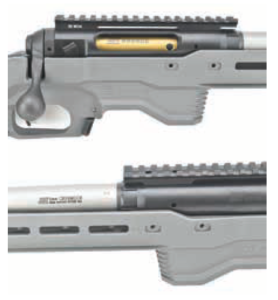
As expected, the Elite Precision employs the Savage AccuTrigger. The look is fairly similar to that of the Ruger’s trigger, with the safety blade protruding from the face of the trigger. With an average pull weight of 1.26 pounds and a standard deviation on that pull of 1.8 ounces, we were pretty happy with the trigger. On its own merits, we probably would have been satisfied with the Savage trigger, but we were comparing it to the Trigger Tech triggers that were used by MPA and Christensen. The difference is noticeable, in Trigger Tech’s favor.
Then Savage took the precision action and mounted it in an MDT ACC chassis, which we think was an outstanding idea. We measured the forend at 17 inches long with a nice, flat bottom along the entire length. That forend has M-Lok slots along both sides as well as the bottom, providing plenty of room and options for attaching things. Even better is the Swiss ARCA rail also running the length of the forend. That gives a shooter (with the correct attachments options on the bipod, like the one we got from Really Right Stuff) the choice of locating the bipod any place along the length of the rail. If all the shooter needs is a way to mount a bipod in a single location and shoot prone, he can mount a Pic rail on the bottom and go to town without all the fancy adapters. Match directors are usually more devious and seem to delight in making PRS shooters find a way to build a shooting position on a very narrow surface. Hence the need for the ARCA rail, which allows the shooter to shorten up the spacing of the bipod. We thought the balance point was a bit too far to the rear. But, again, the MDT chassis offers a solution. There are many attachment points on the forend (inside of it) that allow the addition of weights also offered for sale by MDT (MDTTAC.com) in several sizes for a number of locations on the chassis.
The magwell is flared to allow easier/quicker insertion of most AICS-pattern mags. The mag release is a large paddle that can be easily activated by either hand. There is a ribbed extension in front of the magwell to, once again, help prevent the shooter from jamming the mag into a support bag or barricade. One high-quality MDT magazine is supplied with the rifle.
The rear of the skeletonized chassis has three sets of adjustments. The first two are for adjustments in length of pull as well as cheek height. The buttplate (with rubber buttpad attached) and cheek piece are mounted on and moved by using thumb wheels to extend or retract sturdy screws. Those screws can be locked with easily activated thumb screws. Both pieces have index marks to allow the shooter to quickly return to desired location if something has to be moved (like when you drop the cheek piece to clean the bore). The buttplate can also slide up and down as fits the shooter’s preference for mounting the rifle to the shoulder.
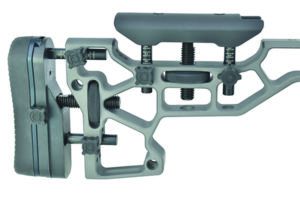
The aluminum chassis is non-folding and Cerakoted for the final finish. The bolt release is on the right side, rear of the action. Both it and the trigger (check your chamber first) must be pressed simultaneously before the bolt can be removed.
One of the best features of this chassis is the MDT pistol grip. Trigger-finger position is hugely important in precision shooting and not everyone has the same size hand. The MDT pistol grip allows the shooter to position the actual grip forward or aft depending on the length of the shooter’s fingers. We are ordering that grip for a couple of our other rifles.
We mentioned the accuracy issue with one of the Federal ammos earlier. This rifle also didn’t like it, especially the Berger 105-grain offering. We found that fascinating because that exact same bullet, as loaded directly from Berger, was, by a fairly large margin, the most accurate we tested.
Our Team Said: The rifle is a bit too light for our tastes, but that can easily be fixed. Our primary surprise came when we tried to run the bolt quickly. No matter what angle we tried with our bolt-throw attempts, the bolt seemed to want to bind on a line at about the 2 o’clock position looking towards the muzzle. We felt like we were having to double-clutch the bolt as it went forward. Maybe that will wear in, but it caused some issues for us, so we brought the grade down a little. Overall, the Savage came in third place in the field trials, with a score only 0.01 inch behind the second-place rifle.
6MM CREEDMOOR Range Data
| 6MM CREEDMOOR Range Data | |||||
| Black Hills 103-grain ELD-X | Ruger Precision Rifle | Savage 110 Elite | Christensen MPR | Masterpiece Arms PMR Pro | |
| Average Velocity | 2819 fps | 2935 fps | 2899 fps | 2839 fps | |
| Muzzle Energy | 1907 ft.-lbs. | 1971 ft.-lbs. | 1923 ft.-lbs. | 1844 ft.-lbs. | |
| Best Group | 0.62 in. | 0.44 in. | 0.59 in. | 0.61 in. | |
| Average Group | 0.75 in. | 0.73 in. | 0.75 in. | 0.79 in. | |
| Black Hills 108-grain ELD-M | Ruger Precision Rifle | Savage 110 Elite | Christensen MPR | Masterpiece Arms PMR Pro | |
| Average Velocity | 2730 fps | 2875 fps | 2890 fps | 2922 fps | |
| Muzzle Energy | 1705 ft.-lbs. | 1983 ft.-lbs. | 2004 ft.-lbs. | 2049 ft.-lbs. | |
| Best Group | 0.55 in. | 0.54 in. | 0.66 in. | 0.64 in. | |
| Average Group | 0.75 in. | 0.66 in. | 0.89 in. | 0.83 in. | |
| Berger 105-grain HT | Ruger Precision Rifle | Savage 110 Elite | Christensen MPR | Masterpiece Arms PMR Pro | |
| Average Velocity | 2830 fps | 2934 fps | 2891 fps | 2926 fps | |
| Muzzle Energy | 1867 ft.-lbs. | 2008 ft.-lbs. | 1949 ft.-lbs. | 1997 ft.-lbs. | |
| Best Group | 0.58 in. | 0.65 in. | 0.40 in. | 0.35 in. | |
| Average Group | 0.67 in. | 0.72 in. | 0.50 in. | 0.61 in. | |
| Federal 105-grain OTM | Ruger Precision Rifle | Savage 110 Elite | Christensen MPR | Masterpiece Arms PMR Pro | |
| Average Velocity | 3056 fps | 3146 fps | 3129 fps | 3160 fps | |
| Muzzle Energy | 2179 ft.-lbs. | 2308 ft.-lbs. | 2284 ft.-lbs. | 2329 ft.-lbs. | |
| Best Group | 0.78 in. | 1.27 in. | 0.77 in. | 0.56 in. | |
| Average Group | 0.86 in. | 1.46 in. | 1.00 in. | 0.76 in. | |
| Black Federal 107-grain SMK | Ruger Precision Rifle | Savage 110 Elite | Christensen MPR | Masterpiece Arms PMR Pro | |
| Average Velocity | 2959 fps | 3049 fps | 3022 fps | 3058 fps | |
| Muzzle Energy | 2081 ft.-lbs. | 2209 ft.-lbs. | 2171 ft.-lbs. | 2222 ft.-lbs. | |
| Best Group | 0.69 in. | 0.87 in. | 0.52 in. | 0.59 in. | |
| Average Group | 0.94 in. | 0.96 in. | 0.53 in. | 0.66 in. |


